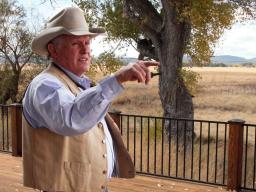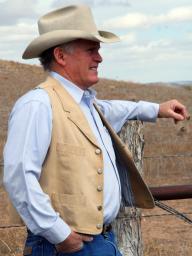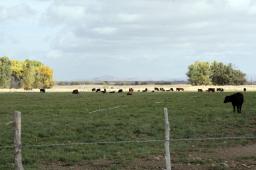- Slug: BC-CNS-Rancher Lawmaker,860
- Note: A Cronkite News Service Weekend Special
- Multimedia: Flash video for computers; YouTube video for iPhone.
- With: BC-CNS-Rancher Lawmaker-Box
- Photos available (thumbnails, captions below)
By ELIZABETH SHELL
Cronkite News Service
PRESCOTT _ For Steve Pierce, being a rancher means making tough choices based on what nature hands you. In recent years, that’s meant dealing with the effects of drought, Pierce said as he scanned the rolling grassland of Las Vegas Ranch.
“We used to run 500 cows. I don’t run that anymore _ down to about 300,” Pierce said as he surveyed his herds. “And I’m going to cut that because we haven’t had any rain and this grass isn’t going to grow anymore.”
When he isn’t on the ranch, Pierce serves as a senator at the Arizona State Legislature. He sees ranchers as bringing an important perspective about rural issues and a willingness to make tough decisions.
“I have a better appreciation for the land, for agriculture and the natural resources we have,” said Pierce, a Republican.
Arizona has a long tradition of lawmaker ranchers, so many that the Capitol became known as home to a “cowboy Legislature.” An unbroken tradition, there has been at least one rancher in the Legislature since Arizona became a state.
Only two ranchers currently serve: Pierce and Rep. Jack Brown, D-St. Johns. While Pierce just finished his first session in the Senate, Brown has been in the House for a total of 33 years since the 1960s.
“We need people like me at the Capitol to point out how important agriculture is in Arizona, to remind people that their food comes from somewhere,” Brown said. “We need to make sure the Legislature remembers that.”
Making tough financial decisions on a ranch isn’t unlike tackling the state’s budget woes, Pierce said.
“When the price of cattle falls, you have to cut back _ on the number of cattle you have, on the number of employees you have,” he said. “You could keep on selling your cattle for money, but then all of a sudden you don’t have any more cattle to sell.”
“Similarly, we have to be careful with the important agencies in the state _ we’ve got less money for the budget but we can’t just keep cutting and cutting until there’s nothing left,” Pierce said.
It’s this type of everyday decision-making that sets ranchers up to be effective politicians, according to Bas Aja, director of the Arizona Cattlemen’s Association.
“Cattle ranchers have a statewide perspective,” he said. “And they’re great communicators and problem solvers.”
As the demographics of the state and the time commitment at the Legislature have changed, some have speculated that the tradition of the cowboy legislator might be coming to an end.
Aja vehemently disagrees.
“That ‘last cowboy’ story has been written since 1890,” he said. “We’ll always have ranchers in the Legislature.”
The Legislature’s schedule was set at 100 days to allow lawmakers to return home and spend the rest of the year herding and planting. This balance worked well for Arizona when the economy was based on labor-intensive agriculture and mining, the “Five C’s” of copper, cattle, cotton, corn and citrus, according to state historian Marshall Trimble.
“It was just a different time. Arizona was smaller and agriculture drove the state’s economic engine,” he said. “It would be a sad day if the cowboy legislators were all gone and we lost what our heritage represents.”
Political shifts have also reduced the number of cowboy legislators. Old representation laws, which until 1966 gave each county two senators regardless of population, gave preference to rural areas. This allowed sparsely populated counties to gang up on those with large populations, Trimble said.
It’s a quiet and cool morning as Pierce sits back and scans the horizon. The economy and lack of rain have not been the best for his ranch, and while he said he truly enjoys being a senator, he hadn’t expected to spend the bulk of the summer in special session working out the state’s budget.
“There needs to be a lot of reform in the state government,” he said. “Salaries, the time you’re in session, education, all need huge reforms. And we can do all that. But it’s a full-time job to get it done.”
Besides working on the budget and dealing with appropriations and natural resources, he brings his perspective to issues that are important to ranchers but may be difficult for the public to understand, such as what to do with horses when they’re no longer healthy. He sponsored a memorial, which wasn’t taken up in committee, that would have petitioned Congress not to prevent ranchers from shipping horses to slaughterhouses in Mexico or Canada.
“People think they’re romantic and nice,” he said. “You can’t have a population that’s not controlled somehow, and there needs to be a way to dispose of them that’s humane.”
Pierce said he finds himself pointing out the importance of agriculture to his colleagues, much like Brown.
“Down at the Capitol I’ve learned there’s so many people that don’t understand food and agriculture. I’ll be in committee and they’ll be talking about land planning and they completely overlook agriculture,” Pierce said. “And I’ll say, ‘Well, where are you going to get your food?’ And they’ll stop and go, ‘Oh, we didn’t think of that.'”
^___=
PHOTOS: Click thumbnails to see full-resolution images.


State Sen. Steve Pierce looks out at his Las Vegas Ranch in Prescott. Arizona has a long history of ranchers as lawmakers, a tradition that inspired the nickname “cowboy Legislature” and contributed to the body’s part-time schedule. As the state has grown and its rules for electing lawmakers have changed, fewer and fewer ranchers have served in Arizona’s part-time Legislature. Pierce, a Republican, says ranchers bring an important perspective about rural issues and the ability to make tough decisions. (Cronkite News Service Photos by Elizabeth Shell)


State Sen. Steve Pierce operates Las Vegas Ranch in Prescott. (Cronkite News Service Photos by Elizabeth Shell)